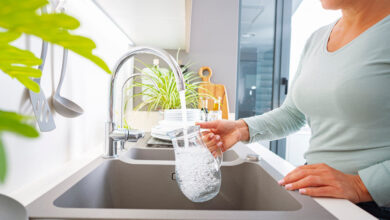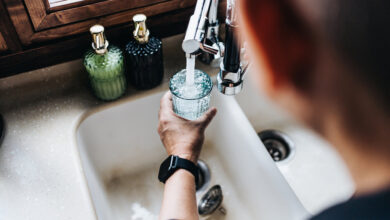What Are the Most Sustainable Forms of Water Filters? – Recent Water Methods

Whereas water is a renewable useful resource, the way in which water is filtered can go away behind a sizeable carbon footprint. Many water filters are fabricated from some type of plastic, however recycling them could also be harder than simply putting them in your recycling bin. The truth is, many water filters aren’t recyclable in any respect. Nevertheless, whether or not they are often recycled or not, some water filters can effectively clear water whereas needing few replacements due to their lengthy lifespans. This retains the system out of landfills and in your house for longer and leaves behind much less environmental influence. Beneath you could find out what makes a water filter sustainable, what sorts of water filters are essentially the most eco-friendly, and which strategies of water therapy are extra dangerous to the surroundings than others.
What makes a water filter sustainable?
An eco-friendly water filter wastes much less water, makes use of fewer supplies, and lasts longer than different filters. No matter what kind of water filter you employ, utilizing one is far more sustainable than shopping for water in plastic bottles. Even the shortest-lasting water pitcher filters exchange round 300 plastic water bottles. With regards to saving plastic, some filtration techniques have an environmental benefit over others. Ceramic filters, for instance, may be cleaned and reused for longer than different filtration techniques. In consequence, much less product is thrown away over the lifespan of the filter. Reverse osmosis filters, then again, can’t filter 100% of the water that feeds into the system. Some water should be used to scrub away contaminants which can be filtered, so it goes down the drain fairly than right into a storage tank. Excessive-efficiency reverse osmosis techniques, then again, permit extra water to succeed in the ultimate product and fewer to scrub down the drain.
Be taught extra: Bottled water vs filtered faucet water: which is healthier?
Most sustainable sorts of water filters
No kind of water filter is 100% sustainable, however some are extra sustainable than others. Some techniques inside one class are extra sustainable, whereas one other system of the identical kind might use way more plastic or waste extra water.
Ceramic filters
Ceramic filters are an reasonably priced and efficient water filtration resolution for properties which can be utilized in countertop, under-sink, and gravity-fed functions. Ceramic filters include pores as small as 0.5 microns that catch particles as water passes via. These pores successfully cut back most micro organism, sediment, and turbidity in water. Ceramic filters are among the finest filtration choices for the surroundings as a result of they are often repeatedly washed and reused. The filters that don’t include a carbon core may be cleaned and reused till water now not flows via them, whereas those who do include a carbon core should be changed when the carbon is ineffective, sometimes each six months to 1 yr. This benefit of ceramic filters not solely advantages your pockets, but it surely additionally helps the surroundings by much less materials being wasted.
Be taught extra: What’s a ceramic filter?
Sediment filters
Sediment filters are sustainable due to their skill to maintain a house’s plumbing, home equipment, and different water therapy techniques. These filters take away filth, sediment, and different particulate matter earlier than they will construct up and clog water circulate. Sediment filters are not often standalone techniques. As an alternative, they’re used at the side of different sorts of water therapy. Reverse osmosis, UV disinfection, water softeners, and different water strategies depend on sediment filters to wash water earlier than it’s launched to techniques down the road. Like most sorts of filters, sediment filters needs to be modified each six months to 1 yr.
Be taught extra: What’s a sediment filter? | What’s a spin-down filter?
Activated carbon filters
Activated carbon filters require alternative extra typically than different filtration techniques, however they don’t include as a lot plastic. If losing plastic is a main concern of yours with water filters, activated carbon filters are a superb choice. Carbon filters should be changed as soon as each six months to 1 yr, and they need to by no means be saved in place for greater than a yr. If the pores of a carbon filter replenish, they will break free from the carbon and enter the water provide. Carbon filters use adsorption, a course of the place contaminants cling to the carbon inside a filter, to cut back dangerous parts in water. As soon as the carbon adsorbs all of the contaminants it will possibly, the filter should be changed to make sure water high quality. Activated carbon filters are widespread in reverse osmosis techniques, fridge filters, and whole-house functions.
Coconut shell carbon blocks are additionally an excellent eco-friendly selection as a result of they’re made with renewable sources. These filters are composed of coconut shells, so they’re sustainable of their manufacturing. Coconuts may be harvested year-round, making them sensible to be used as a filter materials. Not solely are they extra environmentally pleasant than different choices, however coconut shells have the next hardness and resist abrasion higher than some other kind.
Be taught extra: Activated carbon filters 101
Environment friendly reverse osmosis techniques
Reverse osmosis (RO) techniques are one of the crucial common residence water filtration options in the marketplace due to their effectiveness at decreasing dangerous contaminants in water. They deal with water in at the very least three levels: a sediment and carbon pre-filter, a semipermeable membrane, and a sharpening carbon postfilter. All filters apart from the membrane needs to be changed each 6 to 12 months, and the RO membrane needs to be changed as soon as each one to 5 years relying on a wide range of components. In comparison with standard water pitcher filters, RO filters include considerably much less plastic. In consequence, RO filters are sometimes not recycled and may be safely disposed of within the rubbish.
Be taught extra: What’s a reverse osmosis system?l
One other environmental part of RO techniques is wastewater. In an RO system, water is positioned beneath strain and handed via a semipermeable membrane. When contaminants get caught by the membrane, they should be washed away to stop the system from clogging. RO techniques use incoming water to scrub contaminants trapped by the membrane down the drain. The effectivity of an RO system varies vastly relying on water strain, high quality of the system, and whether or not the system is designed for residential, business, or industrial use. Probably the most environmentally pleasant RO techniques make the most of essentially the most water whereas losing the least quantity of plastic.
One other technique to make your RO system extra environmentally pleasant is to make the most of a permeate pump together with your system. A permeate pump retains a reverse osmosis system environment friendly by stopping strain within the water storage tank from slowing down the system’s membrane. This enables the system to make the most of extra water within the filtration course of and causes much less wastewater to circulate down the drain.
Be taught extra: How a permeate pump works in a reverse osmosis system
What are the least sustainable water filters?
It doesn’t matter what kind of water filter you employ, it is going to be extra environmentally pleasant than shopping for water in plastic bottles. Nearly 500 billion plastic bottles are used worldwide in a yr, resulting in an abundance of waste that leaves a sizeable carbon footprint. Whereas all water filters are higher than bottled water from an environmental standpoint, not all are created equal.
Ion change techniques
Ion change techniques are nice at eradicating water hardness or different dissolved ions, however they are often dangerous to the surroundings. For instance, salt-based ion change water softeners discharge salt water into the drain when their ion change resin is recharged. In homes with a septic system, this water enters close by soil and might pollute rivers and lakes, the place excessive ranges of salt are detrimental to marine life. Salt water can be detrimental to waste water therapy crops as a result of it’s notably tough to take away from water throughout therapy. Due to this, some states and municipalities have banned using water softeners altogether.
Be taught extra: What’s a water softener?
Nevertheless, one environmental good thing about water softeners is their skill to make different techniques perform extra effectively. Reverse osmosis techniques, for instance, can turn into clogged attributable to hardness within the water provide. Including a water softener to a reverse osmosis system helps waste much less water by serving to the RO system take away contaminants earlier than going via the RO membrane. Whereas water softeners may be dangerous to the surroundings, they’re mandatory for functions the place water hardness is a critical concern, akin to those that get their water from a effectively. In case you want to stop limescale buildup in your house however don’t need or can’t set up a water softener, take into account a water conditioner as a substitute.
Be taught extra: Water conditioners vs water softeners
Water pitcher filters
Many sorts of water pitcher filters use far more plastic than different sorts of water therapy techniques. These items are interesting to shoppers as a result of they don’t require difficult set up or a big sum of cash, however they do require altering far more typically than different filtration techniques. Water pitcher filters needs to be changed round as soon as for each 40 gallons of water filtered. In comparison with an activated carbon filter, which must be changed as soon as each six months to 1 yr, water pitcher filters waste considerably extra materials. Pitcher filters additionally include extra plastic than different filter sorts, making the waste they produce extra dangerous to the surroundings.
Be taught extra: Do water pitcher filters actually work?
You probably have any further questions on water filtration techniques and their results, please don’t hesitate to contact our consultants.






